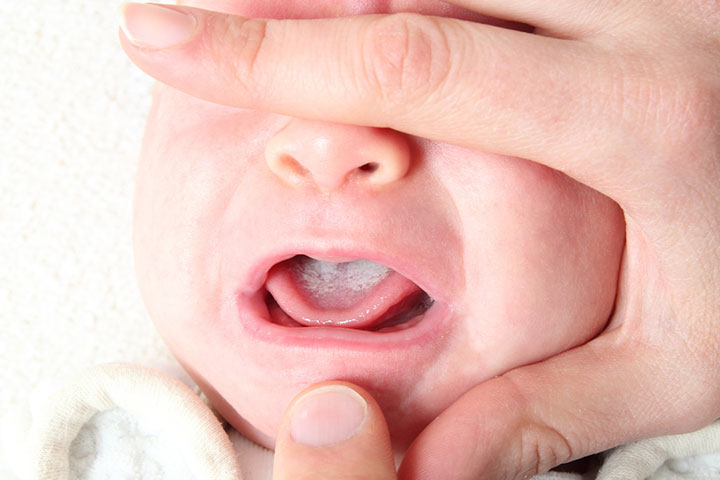You may often notice that your baby cries while breastfeeding. Babies may cry when breastfed for various reasons, ranging from simple distractions to a significant feeding problem.
While occasional weeping or whimpering during nursing is normal, persistent crying and reluctance to breastfeed may necessitate medical treatment or a consultation with a lactation consultant-IBCLC (International Board of Lactation Consultant Examiners).
Read on to learn why newborns cry during breastfeeding and ways to avoid it.
Causes Of Crying In Babies While Breastfeeding
The following factors or situations may make babies fussy or cry during breastfeeding (1).
1. Overactive letdown
Sometimes, if the mother has an overactive or forceful letdown of breast milk, the baby may tend to bite the breast or cry since they cannot swallow too much milk. An overactive letdown may cause colic symptoms for the baby. Hyperactive milk ejection reflex and oversupply may cause gagging or choking while breastfeeding, making your baby cry while nursing.
2. Slow letdown
Slow letdown reflex could cause a slower or inadequate milk supply. Babies may become irritated or cry if they do not get enough milk while breastfeeding.
3. Slow milk flow
Babies can be impatient while waiting for the milk to flow while feeding. Slow milk flow can be due to various reasons, including a slow letdown reflex. Sometimes, a fast milk flow due to overactive letdown followed by a slower flow could make your baby cry since they become frustrated by the changes in the milk flow.
4. Done with feeding
Babies should be the ones ending a feeding. If you continue to feed even when they are refusing, it is normal for babies to cry.
5. Want to burp
Babies may cry or pull off the breast if they want to burp while nursing, especially during the first few months. Most babies do this while changing the breast or after feeding, and a few may not burp without the assistance of the parent. Older babies can relieve gas while they move, and it is rare for them to burp while nursing.
Bottle-fed infants may burp more than breastfed infants as they are fed too fast. Paced bottle feeding method should be used to help the baby get what he/she needs at that feeding not more.
6. Not hungry
Babies who are not hungry may cry while feeding since they do not want to be fed. Crying can be a means of communication for the baby.
7. GERD or acid reflux
Regurgitation of stomach acid to the food pipe could make babies gag or throw up often. Acid reflux may cause irritation or cough and often make babies cry while feeding due to the discomfort.
8. Unusual body odor
Babies may refuse feeding and often cry when they smell a new perfume, soap, or lotion on the breast while feeding since it is unusual for them.
9. Changes in the taste of breast milk
Babies may cry or refuse feeding if the taste or texture of the breast milk changes. Maternal diet, periods, high lipaseiXAn enzyme that breaks down fats in the body by hydrolyzing fatty acid esters levels in the milk or second pregnancy may cause changes in the milk.
10. Growth spurt
Growth spurts or frequency days are times when your baby has more intense growth. Babies can have many growth spurts during infancy, usually during two to three weeks, six weeks, three months, and six months.
The duration of growth spurts may vary in babies, and it may last for a few days. Babies may appear hungrier and feed more during this time. The baby can be fussy and may cry when feeding while experiencing a growth spurt.
11. Preference for bottle-feeding
Babies who are mostly fed from a bottle may prefer bottle-feeding to breastfeeding due to the bottle’s instant and continuous milk flow. They may have passed the suckling phase and find it is easier to feed from a bottle since it involves minimal effort than feeding from the breasts.
12. Preference feeding from one side
Some babies tend to prefer one-sided feeding due to various reasons, and they may cry if you offer the other breast or change the breast during nursing sessions.
13. Cluster feeding in the evening
Babies may feed more before sleeping in the evening hours, and they can become fussy and cry if you end feeding before they feed enough. A slow letdown of milk during cluster feeding may also irritate the baby and make them cry.
14. Teething
Teething may cause swelling and pain in the gums. It can make the baby cry while nursing due to the discomfort in the gums.
15. Thrush
Thrush, also known as oral candidiasisiXA fungal infection caused by the overgrowth of the Candida species, typically affecting the mucous membranes and skin, is a fungal infection caused by the yeast Candida albicans. You may notice whitish coating of the tongue and oral cavity in this condition. Babies with oral thrush may have difficulty breastfeeding due to mouth dryness, burning, or lack of appetite.
They may cry or become fussy due to thrush while feeding, and often the candida infection can spread to the mothers’ breasts while nursing if it is left untreated.
16. Stuffy nose
Babies may cry while breastfeeding due to breathing difficulties caused by nasal congestion. Common cold or flu can be the reason for congested or stuffy noses in many babies. Blocked nose due to an inappropriate breastfeeding position may also cause feeding problems.
17. Food sensitivity or allergy
Babies with food sensitivities or allergies may cry during breastfeeding due to gastrointestinal discomforts. Colic, vomiting, gagging, excessive gas, diarrhea, or skin rashes can be symptoms of sensitivity to foods in mom’s diet.
18. Ankyloglossia or tongue-tie
Tongue-tie is a condition wherein a tight and thick band of tissue tethers the tip or any part of the tongue to the mouth’s floor. Lip and buccaliXIt refers to the cheek or the oral cavity ties can also cause feeding challenges. This condition could affect babies’ ability to suck, and they may turn fussy or cry while breastfeeding.
19. Stress
Babies may feel stressed for various reasons, such as teething, physical illnesses, or even psychological problems, such as fear of being away from the caregiver or parent (separation anxiety). Stress may cause the baby to be irritated and often cry more than usual, including during the nursing sessions.
20. Tiredness
Illnesses or lack of sleep could make babies cry while feeding, and you may also notice them being more irritable in such situations.
Babies may become fussy or cry while breastfeeding due to various reasons. Some babies may go into a nursing strike or breastfeeding strike due to these factors. Breastfeeding strike is a sudden refusal of breastfeeding for several days. It is essential to identify the exact reason behind crying while nursing since adequate feeding is required for your baby’s growth and development.
How To Prevent Crying While Nursing?
Sometimes, it can be difficult for parents to find and resolve the cause of crying while nursing. If your baby frequently cries while breastfeeding or if you are unable to identify the cause, seek help from a pediatrician or a lactation consultant.
The following ways may help calm a crying baby while nursing (1).
- Nurse when the baby is relaxed. You may choose before their sleeping time since babies are less likely to be fussy during this time.
- Take the baby outdoors and feed afterward.
- If the mother is stressed or depressed, the other family member or caregiver may carry the baby until the mom relaxes since babies can often sense emotions.
- Find a calm and dark feeding room or area to reduce distraction.
- Express and bottle-feed breast milk if the baby refuses to suckle. Shift to formula milk only when there is not enough milk supply and after seeking advice from a lactation consultant or pediatrician.
- Do not force the baby to feed if they refuse to feed.
- Feed from both breasts, and switch the breasts if they cry.
- Maintain an appropriate feeding position and change if required.
- Burp the baby in between breasts and at the end of each feeding.
- Opt for surgical repair of tongue-tie after consulting a doctor.
- Treat stuffy nose, thrush, etc. to avoid feeding difficulties.
- Use comfort measures to calm and soothe the baby before continuing feeding.
- Maintain a healthy diet and drink enough water for optimum nourishment if you are a lactating mother. The maternal diet could be linked to food sensitivity in breastfed infants. Speak to a doctor if you suspect your baby is reacting to the maternal diet.
If your baby cries while breastfeeding, look for the causes such as acid reflux, overactive letdown, slow letdown, or not hungry. Some babies may also cry and fuss after they are done feeding. Teething, thrush, growth spurts, and preference for bottle-feeding or one breast can also be the reason for crying while nursing. You may feed the baby when they are hungry and relaxed. Seek suggestions from lactation consultants to manage overactive or slow letdowns with various feeding techniques. You may express and feed using bottles if the baby prefers to be bottle-fed.
Key Pointers
- A baby can cry or become fussy while breastfeeding for various reasons such as overactive or slow letdown, not hungry, or acid reflux.
- Stuffy nose and teething can cause babies to fuss or cry while feeding due to nasal congestion or pain in the gums.
- You may feed on demand and address health issues to prevent cry or fussiness. Expressing and giving bottled breast milk can also help some babies.
Breastfeeding your baby is recommended for the first few months but it may alarm you if your child begins crying every time you try to breastfeed them. Watch this informative video to understand why this happens and how you can deal with it.















